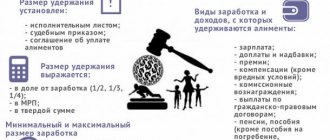Payment of pensions in the Russian Federation exists to help disabled citizens provide for themselves financially.
There are different types, and the classification depends on many factors. A person may lose the ability to work due to illness, injury, congenital characteristics of the body, or with the onset of a certain age.
What determines the calculation of a pension and its size?
The legislation of the Russian Federation, in addition to old-age pensions, provides for payments for the loss of a breadwinner and for disability. An old-age pension is granted upon reaching a certain age. Men can apply for security upon reaching 65 years of age, women - upon reaching 60 years of age . The legislation provides for earlier retirement for people with a certain social status, employed in hazardous and heavy industries, etc.
Age only gives the right, but does not guarantee the appointment of decent security. To receive a retirement pension, you must have a minimum insurance period. In 2020, the minimum insurance period for those entering retirement is 10 years. For those who reach retirement age in 2024, there will be a different requirement - a minimum of 15 years of service.

You need to understand that the insurance period means the period of official employment when the company pays insurance contributions for its employees. The length of service that gives the right to receive financial support includes non-working periods (for example, the period of caring for a young child up to 1.5 years old, etc.).
The size of the pension is determined by the number of points accrued (individual pension coefficient), as well as their value at the time of applying for security. The IPC is calculated using a complex formula based on the amount of wages. The higher its level, the higher the individual coefficient. Those applying for coverage in 2019 must have at least 16.2 points; those retiring in 2025 will have to accumulate 30 points.
The maximum IPC is also limited - in 2020, the maximum you can “earn” is 9.13 points; from 2021, the maximum coefficient will be 10 units .
Directly affects the amount of security and the cost of the coefficient. The price of 1 point in 2020 is 87.24 kopecks, and it is indexed (increased) every year.
Submitting the SZV-STAZH form
Upon reaching retirement age, an employee can contact the employer with an application to send personalized accounting information to the Pension Fund ahead of schedule . In this case, the employer is obliged to provide this information. If the employee does not make such a statement, then the employer is not obliged to take any action. But still, it is advisable to warn employees who are approaching retirement age that this form will be needed to calculate their pension.
If there is an application, the employer must submit information about the pensioner to the Pension Fund using the form SZV-STAZH . One of the purposes of this form is to transmit information about insured persons who need to take into account the periods of the current calendar year to establish a pension. In this case, SZV-STAZH is submitted with the type “Pension Assignment” . The period for preparing the form and sending it to the Pension Fund is 3 days from the date when the employee submitted the corresponding application.
What conditions are needed to receive a pension?
To receive payments, you must reach the age established by law, have a minimum amount of work experience and accumulate an IPC. In this case, you can apply for an insurance pension. If there is insufficient experience or points and it is not possible to increase them, then social benefits will be issued. Those who cannot qualify for an insurance pension, have not reached retirement age, but cannot work due to health reasons, have the opportunity to apply for disability payments.

Insurance
To apply for an old-age pension, you must contact the Pension Fund upon reaching the appropriate age. If the work experience is sufficient and the required number of points have been accumulated, then payments will be assigned.
There is an incentive program that allows a pensioner who has delayed retirement to receive greater security. For each year of later application, bonus points are calculated.
For example, when applying for security three years later, the fixed component will be increased by 19%, and the insurance payment will increase by 24%. The level of future pensions is significantly influenced by the size of contributions, and, accordingly, salary.
Social
Citizens who have reached retirement age but do not have the required minimum work experience or have not accumulated the required number of points can apply for social benefits.
After a five-year period after reaching retirement age, the right to receive a social pension arises. The amount of such payments will be an order of magnitude lower than insurance payments.

Other conditions
If a citizen is unable to work due to health reasons, he cannot apply for insurance coverage. In this case, according to a medical report, he has the right to apply for a disability pension.
Those working in certain sectors of the economy or the public sector have special conditions for retirement. They can issue payments upon accumulating a certain number of years of work experience, and not upon reaching an age limit.
Payments due to an employee
The employer is obliged to pay the employee upon dismissal. These are the following mandatory payments:
- Salary for the period worked.
- Compensation for unused vacation.
- Compensations, the need for payment of which is specified in the internal regulations of the company.
An employer may, at its discretion, pay an employee a one-time bonus. The amount of this payment is set by the head of the company. The amount of the incentive is included in labor costs. You must pay income tax on the payment. Insurance premiums are also paid with the incentive.
However, the employer can formalize the incentive as financial assistance. Such amounts up to 4,000 rubles are not subject to insurance premiums. In addition, according to the law, payments to a retiring employee will not be subject to personal income tax if they do not exceed three times the monthly salary.
At what salary can Russians lose their old-age insurance pension?
One of the conditions for assigning insurance coverage is the accumulation of the required number of points. Over your entire work experience, you need to “collect” 30 points, that is, 0.75 points annually . If the salary before taxes is 50 thousand rubles, then the coefficient will increase over the year to 5.22. To accumulate the minimum required 0.75 points, you need to receive at least 68,400 rubles per year.
If the salary is lower, then by the time of retirement the insured will have a low pension coefficient. As a result, the insurance pension will be delayed for five years.
Employment history
When submitting documents for a pension, an employee will need a work book. It is this document that confirms that the future pensioner has work experience.
The work book is kept in the personnel department. All responsibility for filling it out correctly falls on the personnel officer. He must know all the nuances of filling it out, make sure that there are as few corrections as possible, and that the stamps affixed are legible. Corrections to the document must be made in compliance with certain rules. The personnel officer must own them.
If the employee continues to work in this organization, then the specialist should not hand over the work experience book to the employee.
When an employee resigns upon retirement, the work permit is issued on the day the employment contract with the employer ends. The HR department employee enters the corresponding dismissal record into it.
If, nevertheless, the personnel officer decides to hand over the book to a non-dismissed employee, then the personnel specialist and the head of the company bear responsibility for this document. In this case, it is better to issue a notarized copy of the document.
An employee of the personnel department can make an extract from the work book, which also reflects the number of years of insurance.
How not to be left without a pension and secure your old age
It makes sense for the more active younger generation to think about their own future now. Anton Tabakh, chief economist of the Expert RA rating agency, notes that people in the “gray” sector of the economy cannot count on a pension. To ensure a decent old age, according to the expert, it is necessary to either come out of the shadows, pay taxes and fees, or think about your future maintenance on your own (open a bank deposit, invest money in real estate, etc.). Therefore, you need to decide for yourself what is more important – today’s high salary, but in an “envelope”, or a future decent pension.
Doctor of Economic Sciences Sergei Smirnov is sure that the problem of modern society is the lack of planning skills. Retirement is a reason to think about your future, and you need to look at it not as a need to work until you die, but as an opportunity to plan your own future. After all, no one forbids those receiving a high “gray” salary from making savings for the future today, but you need to think about such contributions not two or three years before retirement, but at the very early stage of career growth.
It is quite difficult to ensure a decent old age during the transition period. Therefore, legislative changes come into force gradually: the retirement age and minimum work experience requirements increase annually. Those who are still far from retirement should plan their future today so as not to end up with nothing in their old age.
Didn't find the answer to your question? Call hotline 8. It's free.
Hot experience
Work in hazardous working conditions is called “hot work”. It follows that hot work experience is a period of time worked under such conditions.
The presence of such length of service presupposes the early assignment of a pension benefit for labor.
Who is eligible for a preferential pension under the hot grid:
- People working in hot production and underground;
- Women textile workers, subject to increased complexity and intensity;
- Men employed in agriculture by profession: tractor drivers;
- Employees involved in ensuring the safety of railway locomotives and metro;
- Working northerners;
- Forestry workers;
- Foreman of unloading and loading works of sea and river ports;
- People whose work is related to geological exploration work;
- Seafarers associated with fish harvesting.
It happens when an employee’s longevity is only half of his total length of service, which reduces the retirement age by one year for several years of longevity.
Workers in the Northern regions receive a benefit if they have at least fifteen years of experience, and from twenty years of work experience when working in areas near the north.
If northerners have benefits for early retirement, the retirement age is reduced by five years.
Average pension in Moscow
Moscow in Russia is perceived almost as a separate country. The city spends billions of rubles on improvement, education, culture, and medicine. The city also allocates huge amounts of money for social support of the population.
This also applies to Moscow pensioners. In the capital, there are de facto 2 different living wages for a pensioner:
- the actual cost of living
is 12,115 rubles, it is used to calculate the regional social supplement to pensions for those who have lived in the capital for less than 10 years; - the city social standard is 17,500 rubles, based on which additional payments to pensions are calculated for those who have lived in Moscow for more than 10 years.
This is the first and main difference for Moscow pensioners. An increased social standard affects the average pension in Moscow:
As you can see, the average pension in Moscow in recent years has been higher than the Russian average by only about 1,000 rubles. At the same time, the price level in the capital differs greatly from the Russian average.
But Moscow pensioners also have other benefits. For example, they are provided with completely free travel on public transport (which in most regions is replaced by a small pension payment). Payments to labor veterans in Moscow
are 1000 rubles instead of 500, as in most regions.
Also, pensioners in the capital have the right to receive some medications for free, to use various healthcare and cultural institutions completely free of charge (and the quality of medicine there is usually higher than in the rest of Russia).
Conclusion: although in Moscow the average pension is only a thousand rubles higher than the Russian average, the difference in the cost of living is compensated by a large number of benefits
.
Summarize
The legislation does not prohibit and even directly provides for the possibility of a “pension” part of the social package. At the same time, the provision for such payments should not be included either in the employment or collective agreement, since this will not allow the employer to achieve the required goals.
It is better to fix the corresponding obligation of the company in relation to former employees this way. The very fact of providing such payments and the rules by which they are carried out should be formalized in the local regulatory act of the organization (for example, in the Regulations on social guarantees for employees). And on the basis of this document, conclude a separate agreement on the payment of a “pension” with each of the dismissed employees. At the same time, it is better to carry out the dismissal itself by agreement of the parties (Article 78 of the Labor Code of the Russian Federation), since for this situation there is established judicial practice confirming the legality of the payments in question.
How to find out the amount of pension savings?

Finding out the amount of pension savings with the help of modern gadgets is not difficult.
Today, it is very easy to find out the size of your pension; any citizen of the Russian Federation can do this. There are several ways:
- All you need to do is contact the Internet and schedule an online consultation with the Pension Fund.
- An alternative way is to go to your personal account on the website of the Russian Pension Fund.
- There is also the option of contacting the bank, subject to certain agreements.
- Also, there are special online calculators for calculating pension savings.
How points are calculated
To better understand how the number of points for an employee is calculated in practice, let’s give an example of calculating a pension.
Currently, for each employee, the employer contributes 16% of his income to the Pension Fund of the Russian Federation, and if the employee voluntarily forms a funded pension, then 10%.
Let's assume that you work, for example, as a driver, and your salary is 22,000 rubles monthly - a total of 264 thousand rubles per year. For 2020, your employer will transfer 42,240 rubles to the Pension Fund for you - this is the amount of annual insurance contributions. At the same time, the maximum amount of insurance contributions for the maximum salary established by the government (59,250 rubles) is 113,760 rubles. We calculate the number of points:
42 240 / 113 760 * 10 = 3,713
That is, at this salary level you will receive approximately 3.7 points. If your salary is indexed at the same rate as the maximum salary limits used in calculating your pension, you will accumulate 30 points after just 8 years of work. However, to receive a pension, you will need to work for at least another 7 years and reach the age specified by law. But an employee with the maximum salary will be able to score the required 30 points within a year, which, with a long work history, will provide him with a high amount of pension payments.
If you plan to apply for a pension in the next 10 years, while the legislation is in a transitional stage and innovations are not fully applied, then when calculating the number of points you earned before 2020, the amount of your available pension capital will be taken into account. The number of IPCs will be calculated using the following formula: Number of IPCs = (pension capital + amount of insurance contributions from 2002 to 2014) / cost of one point
.
Is studying at a university included in your work experience?
This question worries the minds of many citizens throughout Russia.
According to current legislation, this includes:
- Labor activity that is carried out in accordance with an agreement concluded between the employee and the employer.
- The time that a person is engaged in individual entrepreneurship.
- The time a person devoted to state or municipal services.
Besides:
- Time spent repaying one’s debt to one’s homeland, i.e., completing full military service.
- Time to care for a child under the age of one and a half years.
- He was unemployed, but was registered as a job seeker.
Since this list does not include studies in higher educational institutions, it means that it is not included in the work experience, regardless of the form of study (full-time, part-time).
However, there is one trick that is an exception to the rule. All those who study at military universities or are studying to become law enforcement officers can safely include their training time in their work experience. Indeed, in this case, study is equivalent to full-fledged military service.
Payments after dismissal in the contract: to be or not to be
Applying this logic to the part of the social package we are considering - payments for the maintenance of an employee after his dismissal - we find that such an obligation of the employer can remain with him after the termination of the employment contract only if it arose during the period of validity of the contract. In our opinion, in this case this means that the amount of payments should be finalized on the date of dismissal. Under such circumstances, the condition of the employment contract on the payment of maintenance after dismissal will not only be completely legal, but will also remain in force after the termination (termination) of the contract.
However, in practice, this approach will immediately lead to additional problems. Firstly, it is not always possible to determine the entire amount due to the employee on the date of dismissal. After all, it may depend on factors beyond the will of the parties. For example, such payments often stop if the dismissed employee is hired.
Secondly, even if the employer was able to determine the amount of payment on the date of dismissal, then due to the imperative requirements of Art. 140 of the Labor Code of the Russian Federation, he will have to pay the employee in full directly on the day of dismissal. After all, the Labor Code of the Russian Federation does not contain any exceptions for the situation under consideration.
As we can see, the inclusion in an employment contract of a condition on payments after dismissal, the purpose of which is to support the former employee, will not allow the parties to achieve the required result: either this condition will cease to exist along with the employment contract, or the employer will have to pay the entire amount as a one-time payment. Accordingly, an employment contract is not an ideal place to fix the part of the social package in question.
The inclusion of the payments in question in the collective agreement will not improve the situation. The fact is that according to the rules of Art. 43 of the Labor Code of the Russian Federation, the collective agreement applies to all employees of the organization. The Labor Code of the Russian Federation does not contain provisions providing for the possibility of extending the validity of the collective agreement to former employees. In addition, the validity period of the collective agreement is limited to three years (Article 43 of the Labor Code of the Russian Federation), which may be insufficient for the payments in question.
Is it possible to pay a former employee?
Let's start with the main point: can an employer, in principle, pay its former employees any amounts that are in no way related to the latter’s performance of their labor duties during the contract period? The legislation does not provide a direct answer to this question. However, there are indirect indications that such payments are acceptable.
So, in paragraph 25 of Art. 270 of the Tax Code of the Russian Federation, among payments that do not reduce the tax base for income tax, we find mention of pension supplements that can be paid by organizations to their former employees. There are similar “beacons” in judicial practice. For example, in the Ruling of the Supreme Court of the Russian Federation dated September 23, 2016 No. 305-KG16-5939, the judges came to the conclusion that upon termination of an employment contract, by agreement of the parties, both amounts that are severance pay and amounts that are personal security for employees provided for the period after their dismissal. This definition is included in the Review of Judicial Practice of the Supreme Court of the Russian Federation No. 4 (2016) (approved by the Presidium of the Supreme Court of the Russian Federation on December 20, 2016), which allows us to say that the conclusions made by the court were not accidental.
Thus, it can be stated that the employer has the right to pay its former employees amounts not related to the performance of work duties, that is, which are essentially a kind of pension provision for former employees. This means it’s time to move on to issues of their legal registration.
Can such an obligation of the employer be fixed directly in the employment contract? Or does this make no sense, since after dismissal the employment contract will no longer be valid and, therefore, the corresponding obligation of the employer will not have legal force?
Where does the pension registration begin?
Registration of a pension is, by and large, a personal matter for the employee. With an application for a pension, he must apply to the Pension Fund of the Russian Federation at his place of residence (Clause 1, Article 18 of the Federal Law of December 17, 2001 No. 173-FZ “On Labor Pensions in the Russian Federation”, hereinafter referred to as Law No. 173-FZ), or to a multifunctional center (MFC). You can submit your application in person, through a representative, through your employer, or by mail. There is another option - to submit an application in the form of an electronic document through the citizen’s personal account on the official website of the Pension Fund.
The employee also collects and attaches the necessary documents to the application for a pension:
- passport (not required if the application is submitted through the citizen’s personal account);
- work book or other documents confirming work experience (for example, a certificate from the employment center or military ID);
- a certificate of average monthly earnings for 60 consecutive months (that is, five years) before January 1, 2002.
In some cases, the future pensioner will need to collect other documents (for example, a certificate of marriage or divorce, a certificate of disability, a residence permit).
However, the employer must also perform some actions related to the registration of an employee’s pension.










